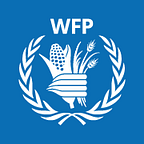School meals from the World Food Programme make a difference for two brothers with disabilities
Omar and Richard recently picked up take-home rations at their special education school in western Venezuela
By Samuel Gómez
Brothers Omar (9) and Richard (4) have Glycogenosis type 3, a neuromuscular disorder. Both attend the Valmore Rodríguez Special Education School in the state of Trujillo, Venezuela.
They are at school today with their mother Yolabel Viloria to collect their monthly food rations. The World Food Programme (WFP) is providing food kits to more than 5,000 students and over 2,500 staff in special education schools in the states of Falcón, Trujillo, Yaracuy, and Barinas.
While she waited in line, Yolabel talked about her children and the challenges they face. In Omar’s case, he had difficulty crawling when he was only 8 months old and years later had to undergo surgery because he began to walk on his tiptoes.
Since her parents live a couple of blocks from their school and mobility is an issue, the children stay with them during school days, and she comes to visit. They also help in other ways.
“Thanks to the efforts of their father [her ex-partner] and my parents, we get milk and eggs. Once or twice a week we also eat chicken or beef. Since we started getting lentils through the World Food Programme, we can prepare nutritious meals like lentil meatballs. You have to be creative with what you have, because it’s hard to have access to a full food basket,” said Yolabel.
The food WFP provides is intended to cover the caloric needs of children for one month, consisting of 6 kg of rice, 4 kg of lentils, 1 pound of iodized salt and 1 liter of vegetable oil.
Some are “expensive products we would not be able to buy, like vegetable oil and lentils, which are important for our diet because they are rich in vitamins and proteins,” said Yolabel.
For children with disabilities, it is important to eat nutritious and healthy foods, including fruits and vegetables.
In July 2021, WFP started operations in Venezuela with the launch of a school meals programme in the state of Falcón. In early 2022, WFP expanded operations to the states of Yaracuy, Barinas, and Trujillo with the aim of reaching more than 1,000 pre-schools and special education schools.
